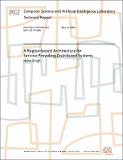A Region-based Architecture for Service-Providing Distributed Systems
Author(s)
Singh, Neha
DownloadMIT-CSAIL-TR-2005-032.ps (109.0Mb)
Additional downloads
Other Contributors
Advanced Network Architecture
Metadata
Show full item recordAbstract
A service-providing system consists of hosts that provide services such as data, content, computational and memory resources and data-based services to other entities in the system. Consumers that wish to use services describe their needs with a set of high-level objectives. In this thesis, we address the problem of locating services in a large-scale distributed system using their descriptions, rather than their addresses. We propose a network architecture that is based on the concept of dividing the service-providing hosts into Regions. A Region is a grouping of elements of the network that share a set of common characteristics and policies. Members of a region manage their interactions with other regions and their elements according to some defined rules and policies. Hosts can be divided into regions based on various properties such as their content, their commercial model or their security characteristics to name a few. The service provided by a region is an ! aggregate of the services provided by all its member hosts. The region-based architecture routes a service request through the network efficiently based on its description and on the advertisements from regions providing services. Division of hosts into a set of independent regions partitions the search space and produces a scalable structure. The architecture also does not impose any rules on the internal organization of regions making the system flexible and dynamic.
Date issued
2005-05-17Other identifiers
MIT-CSAIL-TR-2005-032
MIT-LCS-TR-989
Series/Report no.
Massachusetts Institute of Technology Computer Science and Artificial Intelligence Laboratory